AlphaESS UK Home Battery Storage Q&A
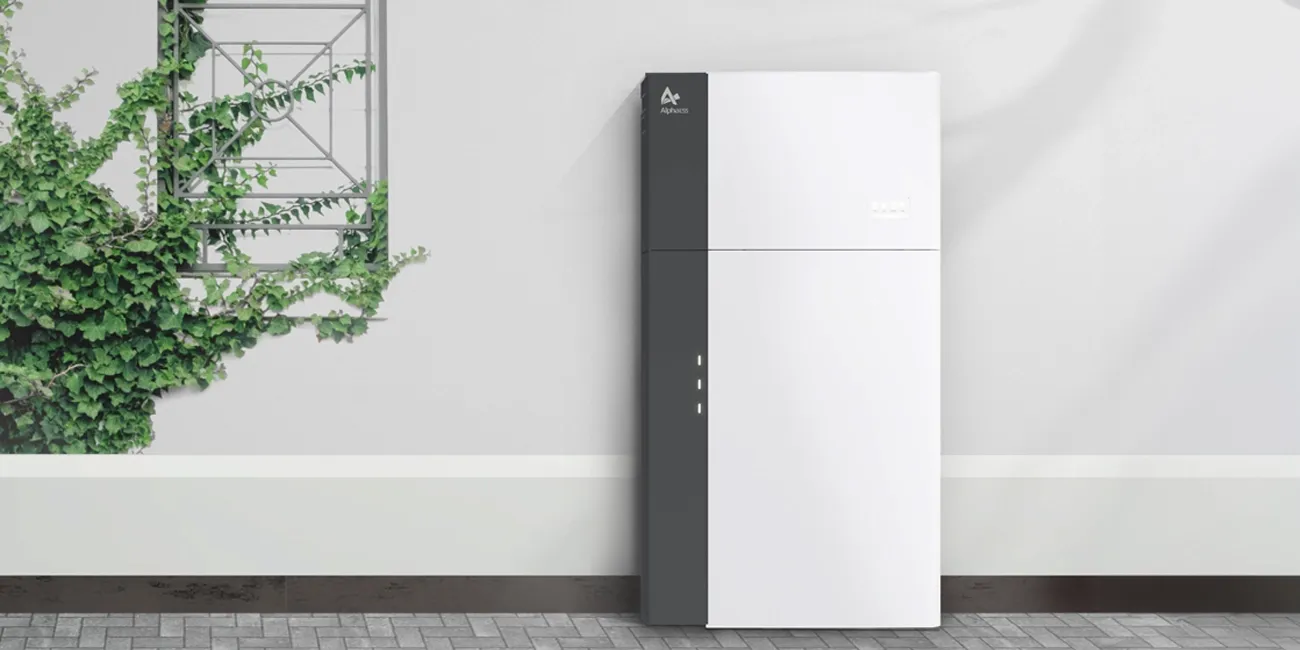
As energy costs rise and the push for sustainable living grows, many UK homeowners turn to home battery storage solutions to enhance their energy independence and efficiency. AlphaESS UK, a leading provider of residential energy storage systems, offers a range of innovative products designed to store electricity from renewable sources and the grid, providing backup power and reducing reliance on traditional energy supplies.
This Q&A will answer the most common frequently asked questions about home battery storage systems and outline the AlphaESS Smile range of power storage solutions, helping you understand how these can benefit your household and reduce your bills. Whether you're a homeowner or renewable energy installer, looking to retrofit a battery to your existing solar system, as part of a solar panel installation, or even considering home battery storage without solar, this guide covers all you need to know to make an informed decision for your energy needs.
What is a home energy storage system?
A home energy storage system is a technology that allows homeowners to store electricity generated from renewable sources, such as solar panels, wind turbines, air source heat pumps or the grid during off-peak hours when electricity rates are lower. These systems typically use batteries to store energy, which you can use later during peak demand times, power outages, or when renewable energy sources are not producing electricity. AlphaESS UK offers various residential energy storage systems, including the SMILE series, designed to maximise self-consumption and provide backup power, ensuring that stored energy is available when needed.
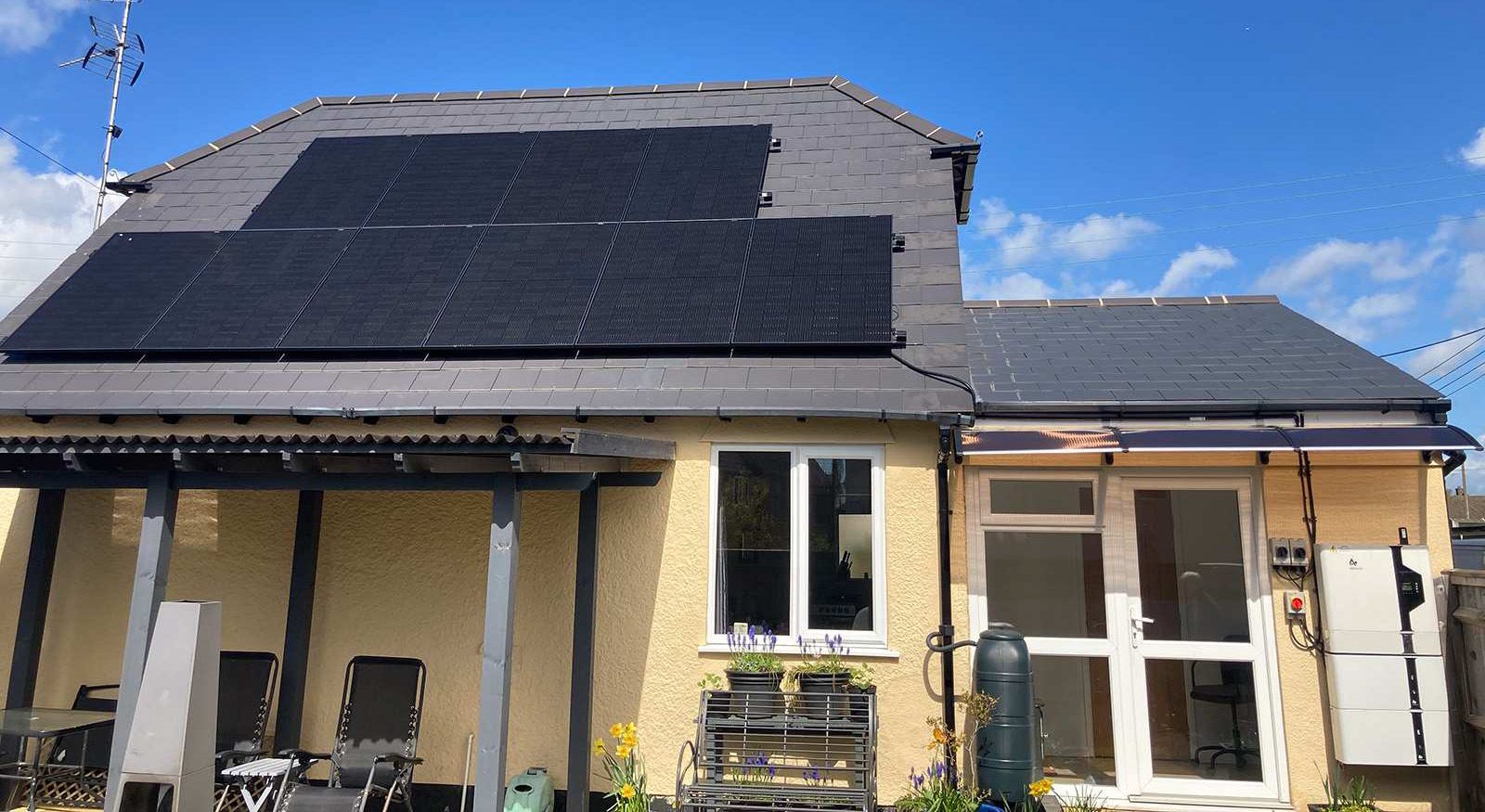
The above image demonstrates a typical UK home with Photovoltaic (PV) solar panels connected to an AlphaESS Smile home battery storage system.
What are the primary components of a home energy storage system?
- Batteries: These are usually LiFePO4 batteries, also known as lithium iron phosphate batteries. They are known for their high energy density, long life, and reliability. They store electricity and release it when needed.
- Inverter: Converts the stored DC electricity from the batteries into AC electricity used in homes.
- Energy Management System: This system controls the charging and discharging of the batteries and can optimise the use of stored energy based on consumption patterns and grid conditions. You can monitor and control your battery power and distribution using our AlphaCloud App.
What are the benefits of Home Energy Storage Systems?
- Backup Power: Provides electricity during power outages, ensuring that essential appliances and systems remain operational. This must be discussed with you installer as in many cases additional work will be needed if you wish to use this feature.
- Cost Savings: Homeowners can reduce their electricity bills by storing electricity during off-peak hours, when rates are lower, and using it during peak hours.
- Increased Self-Consumption: Enhances the use of electricity generated from home renewable energy sources, reducing dependence on the grid.
- Grid Support: This can help stabilise the grid by providing energy during peak demand.
- Virtual Power Plant (VPP): This technology allows multiple systems or homes to become a shared power source. (see below for more information).
Who is AlphaESS, and Why Choose Them?
AlphaESS is a leading global provider of energy storage solutions. Founded in 2012, it serves over 50 countries. The company specialises in residential and commercial, and industrial energy storage systems designed to enhance renewable energy usage, provide backup power, and improve energy efficiency. By choosing AlphaESS, you're not just choosing a product; you're choosing to take control of your energy needs with a reliable and trusted partner, empowering you to control your energy consumption.
AlphaESS UK, headquartered in Cheshire, is the British division of the company. Our support and technical team are based in the UK, ensuring that your Authorised Installer has dedicated support if required.
Are there different types of AlphaESS battery solutions?
Yes, we offer a range of residential, and commercial and industrial products, each with modular battery options to tailor a system to your specific needs. Our Smile range of home battery storage systems, including our latest Smile-G3 series, delivers a powerful and cost-effective range of residential energy storage systems. Whether you're interested in larger commercial products, a system for your home, or even a utility-scale energy storage system, AlphaESS offers the flexibility to adapt to your changing energy needs and scenarios, whether on-grid or off-grid, ensuring your investment's long-term viability.
Can I install an AlphaESS battery without solar panels?
Yes, you can install AlphaESS batteries without solar panels. The systems can store electricity from the grid during off-peak hours and use it during peak times, which can help reduce electricity bills and provide backup power during outages.
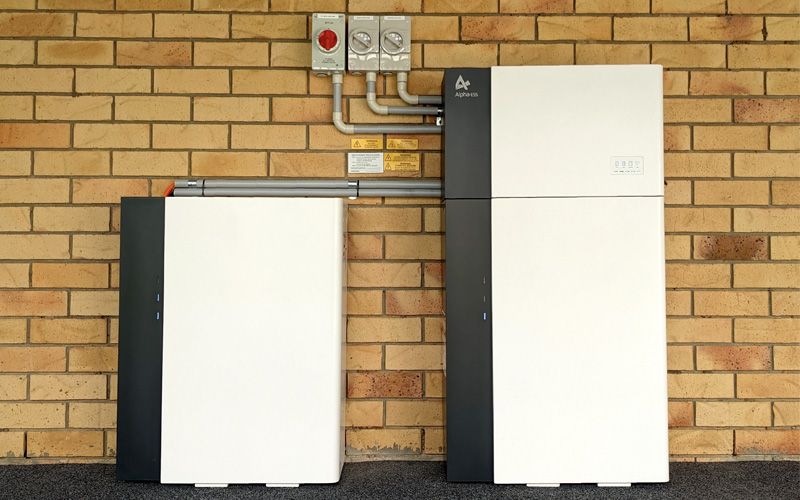
AlphaESS Smile G3
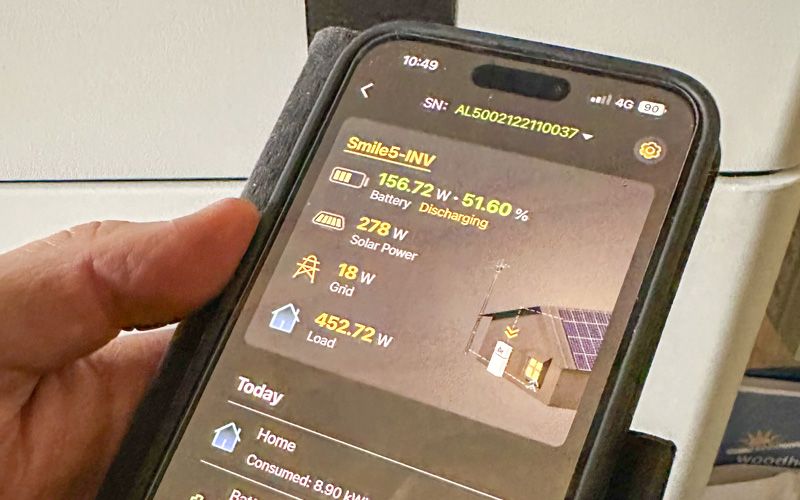
AlphaCloud App
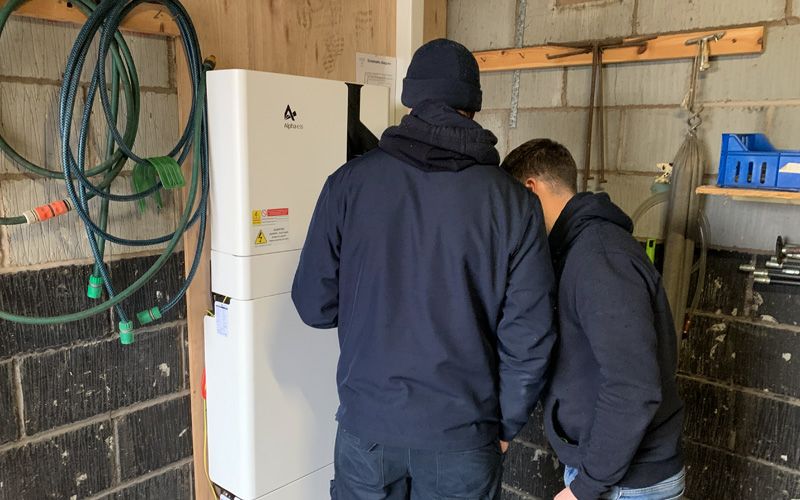
Final Commissioning Checks
I live in a rural location - Can I benefit from using Battery Energy Storage?
For people who live in a rural location, battery energy storage is the ideal solution, whether you have a renewable source or not. Power outages are more common in a rural setting, and an AlphaESS Battery Energy Storage System can be used as a backup power source, pulling and storing electricity from the grid at off-peak or from your renewable energy source.
What are the benefits of retrofitting an AlphaESS battery to my existing solar system?
Retrofitting an AlphaESS battery to an existing solar system is like giving your solar panels a power boost, even a new lease of life. It can enhance energy independence by storing excess solar energy for later use, maximising the return on investment from your solar panels and providing a reliable backup power source. Systems like the Smile G3 are ideal for straightforward retrofitting due to their Hybrid nature. They can be installed as an AC stand-alone system or installed as part of your solar system. These systems can often be favoured by housing associations and landlords looking to enhance properties by adding battery energy storage without major upheaval to properties.
How does the AlphaESS SMILE-G3 system work?
The SMILE-G3 system offers a scalable BESS capacity from 3.8 kWh to over 60 kWh with its hybrid inverter and modular battery design. It can be AC or hybrid-coupled and features VPP readiness, ensuring it can adapt to your changing energy needs and scenarios, whether on-grid or off-grid. This adaptability assures homeowners they can control their energy needs, no matter the circumstances.
How much energy can the AlphaESS SMILE-G3 store?
The AlphaESS SMILE-G3 series offers a wide range of storage capacities, from 3.8 kWh to 60.5 kWh, depending on the configuration and number of battery modules used. This flexibility makes it suitable for various household energy needs, even for small-scale commercial applications.
Can you explain kWh?
Every electrical item in your home uses different power depending on its wattage. The simplest way to look at it is a 1,000-watt appliance running for an hour at full power; it will take 1 hour to use 1kW. Here are some examples:
- Running a dishwasher (1,000 watts): 1 hour
- Watching a 50″ LED TV (50 watts): 20 hours
- Cooking in the oven (2000 Watts): 30 minutes
- Running the refrigerator (300 Watts): 3 hours
- Using a Games Console 4 (150 Watts): 6.66 hours
If you have an electric vehicle, you can make tremendous savings by pulling power from the grid at the off-peak rate (which can be up to 50% cheaper with certain energy providers and tariffs) and using this stored power to charge your EV. Charging your electric vehicle with a 22kW car charger for one hour will consume 22 kWh of energy.
Can the AlphaESS SMILE-G3 operate off-grid?
Yes, as previously mentioned, the SMILE-G3 can operate in off-grid scenarios. Its robust inverter and battery system provides continuous power even when the grid is down, giving you the peace of mind that you're prepared for any situation, especially in areas with unstable grid supply. This continuous power supply ensures homeowners feel secure and confident in their energy system.
What is the lifespan of an AlphaESS battery system?
AlphaESS battery systems come with a 10-year performance warranty. The batteries use LFP (LiFePO₄) chemistry, known for its long cycle life and reliability, ensuring that the system will perform effectively for many years.
Are AlphaESS systems compatible with different types of solar panels?
Yes, AlphaESS systems are highly compatible with various solar panel types. The SMILE-G3, for instance, supports different PV inputs and can work with third-party solar inverters, making it a versatile choice for homeowners and installers across many installations.
How does the AlphaESS system manage and monitor energy usage?
AlphaESS systems come with the AlphaCloud monitoring platform, which allows users to monitor their system's performance, control energy usage, and even participate in virtual power plants (VPPs) and discharge to the grid. This 24/7 online monitoring ensures optimal system management and efficiency. Don’t worry; your AlphaESS UK Authorised Installer will explain how the app works and will be on hand if you have any issues.
What is a Virtual Power Plant?
All energy generators and consumers are connected to a Virtual Power Plant central control system. This centralised control system monitors energy usage and demand at all times. As a cloud-based network, there are no delays in balancing energy usage as demand fluctuates.
Energy demand fluctuates during the day. Virtual Power Plants can reduce the energy used in a specific location to meet this fluctuating demand. These minor adjustments would quickly go unnoticed, such as lowering the air conditioning in a building for a couple of seconds.
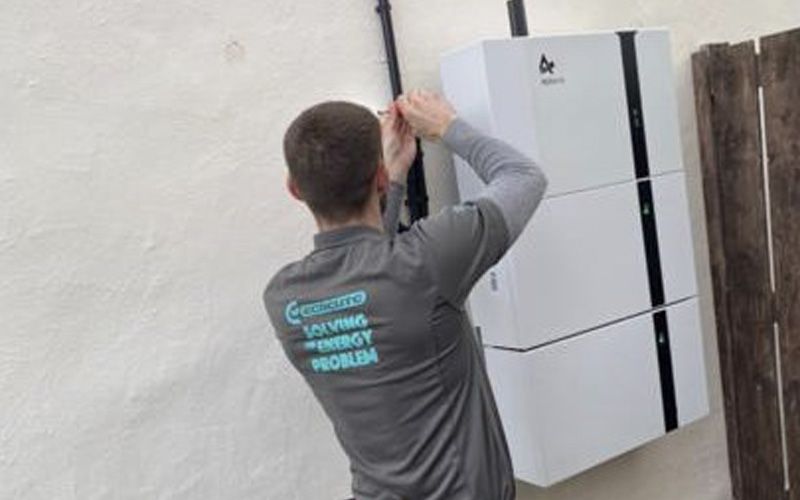
Outdoor installation and easy servicing
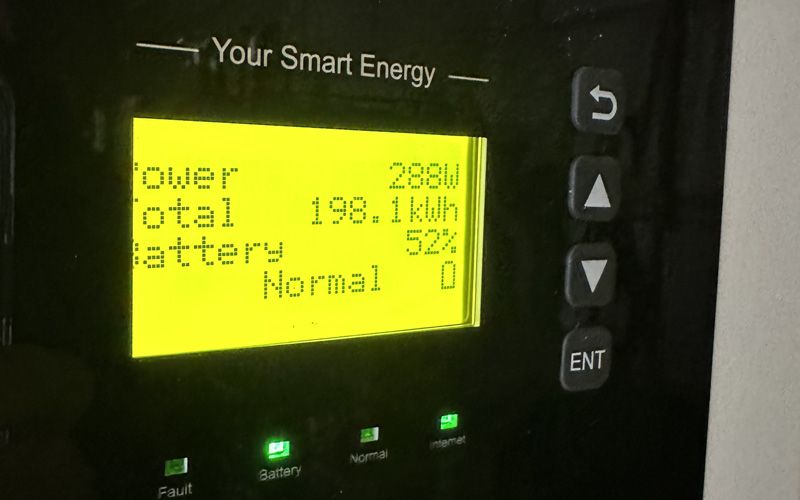
Simple display allows you to montior power and charge
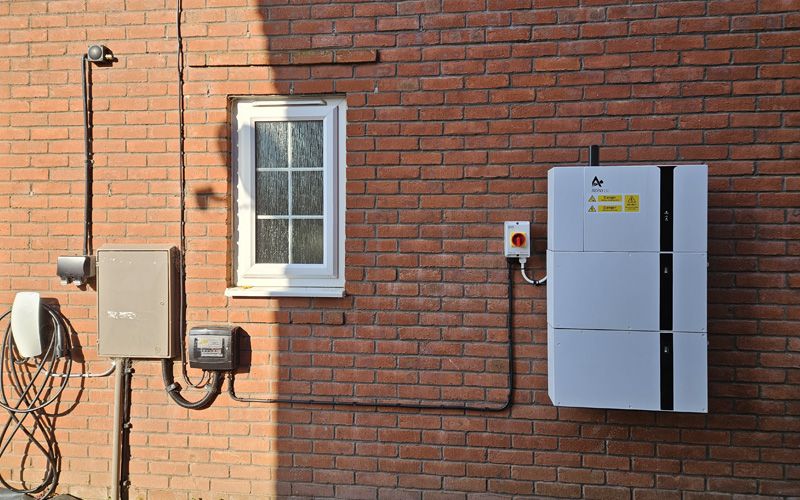
Your BESS connects to your EV charger
What makes the AlphaESS SMILE series an excellent choice for UK homeowners?
Renowned for their easy installation, the AlphaESS SMILE series offers an affordable way to add battery energy storage to your home, modular for scalability, meaning you can add additional battery power to scale up your energy independence whenever required. It is also compatible with UK energy systems. With features like VPP readiness, modular battery design, and comprehensive warranties, it offers a reliable and cost-effective energy storage solution for UK homeowners. Moreover, these German-designed systems are suitable for indoor and outdoor installation, saving valuable indoor space and are ideal for locating on exterior house walls or within garages and outbuildings.
What is the depth of discharge (DoD) for AlphaESS batteries?
The depth of discharge for AlphaESS batteries is 95%, meaning the batteries can be discharged almost completely before recharging. This high DoD allows for more usable capacity and efficiency in energy storage.
How easy is it to install and expand an AlphaESS system?
AlphaESS systems are designed with a modular, Lego-style battery configuration, making installation and expansion straightforward. Homeowners can start with a smaller system and add more batteries to increase storage capacity. Check the maximum capacity before you have a system installed. Our UK-wide network of approved and authorised battery energy installers is vast. Each is familiar with our systems and has access to our UK-based product and technical support teams. You can view some of our installations by visiting the AlphaESS UK Installer Spotlight.
What is the environmental impact of energy batteries?
AlphaESS uses only Lithium Iron Phosphate (LFP) for its battery cells. As the electrodes in LFP batteries are made from non-toxic materials, they pose a much smaller threat to the environment than lead-acid batteries. LFP batteries can also be recycled to reuse the materials of the electrodes, wiring, and casings, some of which are used in new lithium batteries.
Due to the long lifespan of LFP batteries, the recycling processes are still in the early stages, but LiFePO4 batteries that contain recycled materials are already available. As more lithium batteries reach the end of their useful life, recycling will become more efficient and cost-effective as engineers continually improve the processes to recover the materials.
Do I need planning permission for solar PV or battery storage installation, or are there any regulations I have to follow?
Domestic solar PV and battery storage systems generally fall under permitted development rights, meaning planning permission is not usually required. Listed buildings and properties in conservation areas may have additional restrictions. Ensure your installers and products are MCS-certified to ensure they meet high regulatory standards. MCS certification is required to be eligible for financial incentives such as the Smart Export Guarantee (SEG).
Does BESS require Maintenance and Servicing?
Your installer will plan a maintenance and servicing schedule, but AlphaESS battery energy storage systems shouldn't require more than a yearly check. You should always give the appliance a routine visual check to ensure the casing is not damaged or sitting in standing water; if you have any concerns, always contact your installer.
What do I do next to install an AlphaESS Home Battery Storage System?
Now that you are ready to speak to an AlphaESS UK Authorised and Accredited Installer, visit our Find an Approved UK Installer page. You can search in your area using the View Map or complete the form, and we will connect you with the best installer for your needs.
The AlphaESS UK Residential Q&A may leave you with more questions, and there is a lot of terminology to get your head around. Our Jargon Buster below will help you understand more about renewable energy. However, if you would like to speak directly to the UK-based AlphaESS team, simply call us on 0330 043 2610, and we’ll be delighted to assist.
Renewable Energy Jargon Buster
The type of electrical current used in homes and businesses. It changes direction periodically and is what most appliances use.
Electrical current that flows in one direction. Solar panels generate DC electricity, which must be converted to AC for home use.
The SEG mandates that licensed electricity suppliers offer a tariff and pay residential and small-scale low-carbon generators for electricity exported to the National Grid.
A system that monitors and manages the charging and discharging of the battery to ensure it operates safely and efficiently.
The percentage of the battery's total capacity that has been used. A higher DoD means more of the battery's capacity is utilised.
A system that optimises the use of energy stored in the battery by managing when to charge and discharge based on consumption patterns and grid conditions.
The network that delivers electricity from producers to consumers. When you use electricity from your utility company, you use grid power.
A device that converts DC from solar panels or batteries to AC for home use. It can also manage the energy flow between solar panels, batteries, and the grid.
A device that converts DC electricity from solar panels or batteries into AC electricity used in homes.
A unit of energy represents the amount of power used over time. One kWh is equivalent to using 1,000 watts for one hour.
A lithium-ion battery is known for its safety, long life, and thermal stability.
These are times when electricity demand and prices are low. Usually overnight.
Technology that converts sunlight into electrical energy, commonly known as solar panels.
These are energy sources that are naturally replenishing from your environment, such as solar, wind, and hydropower.
Using the electricity generated by your solar panels or stored in your battery rather than relying on the grid.
This is a network of decentralised power-generating units (like home battery systems) that are virtually connected and managed as a single power unit.
This design allows batteries to be added or removed easily to increase or decrease storage capacity.
Power provided by a battery system during a grid outage to keep essential appliances and systems running.
The number of complete charge and discharge cycles a battery can undergo before its capacity falls below a certain percentage of its original capacity.
Example Usage:
-
AC:
The lights and appliances in your home run on AC power.
-
BMS:
The BMS ensures your battery doesn't overcharge or deplete too much.
-
DoD:
A battery with a 95% DoD can use 95% of its stored energy before needing a recharge.
-
kWh:
Your electricity bill shows how much kWh you use monthly.
Contact Us Today
To start your journey to a more sustainable, clean energy future with battery energy storage systems, call 0330 043 2610 or complete our quick enquiry form here.